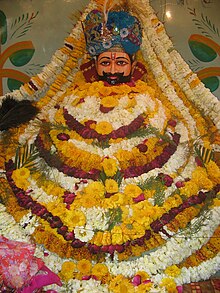Barbarika
This article needs additional citations for verification. (April 2016) |

| Khatu Shyam | |
|---|---|
War, Sacrifice | |
| Other names | Barbarik, Khatu Naath |
| Abode | Mount Meru |
| Symbols | Bow, Arrow |
| Texts | Mahabharata, Puranas |
| Festivals | Khatu Shyam Jayanti |
| Parents | Ghatotkacha (father), Mauravi (mother) |
Barbarika (Barbarīka) Barbarika in Hinduism is the son of Ghatotkacha (Son of Bhima) and Princess Maurvi, daughter of Daitya Moora,[1] though other references state that he was a warrior from the south. He was a character in the Mahabharata, a warrior who could change the outcome of battle in just few minutes.[citation needed]
In Nepal, Kirati king Yalambar is believed to be the Barbarik of Mahabharata, son of Ghatotkach and grandson of Bheem. Legend credits him with meeting Indra, the lord of heaven, who ventured into the Valley in human guise, while natives of the Kathmandu Valley portray him as Akash Bhairav.[2]
In Rajasthan, Barbarika is worshipped as Khatu Shyam in Khatu Shyam Temple,[3] and in Gujarat, he is worshipped as Baliyadev.[citation needed]
His legendary arrows
[edit]Barbarika/ Belarsen was a grandson of Bhima (second of the Pandava brothers), and the son of Ghatotkacha. Ghatotkacha was the son of Bhima and Hidimbi. He learnt the art of warfare from his mother Ahilāvati who was also known as Mauravi (daughter of Mura). The gods (ashtadeva) gave him the three infallible arrows.[4]
See also
[edit]References
[edit]- ^ Parmeshwaranand, Swami (2001). Encyclopaedic Dictionary of Puranas. Sarup & Sons. p. 155. ISBN 978-81-7625-226-3.
- ^ "{title}". Archived from the original on 25 February 2013. Retrieved 17 January 2014.
- ^ "जानिये कौन हैं ये खाटू श्याम महाराज". newstrend.news (in Hindi). Newstrend. 14 October 2018. Retrieved 3 May 2020.
- ^ Alf Hiltebeitel (2009). Rethinking India's Oral and Classical Epics. University of Chicago Press. p. 431. ISBN 9780226340555. Archived from the original on 5 March 2016. Retrieved 28 October 2015.
